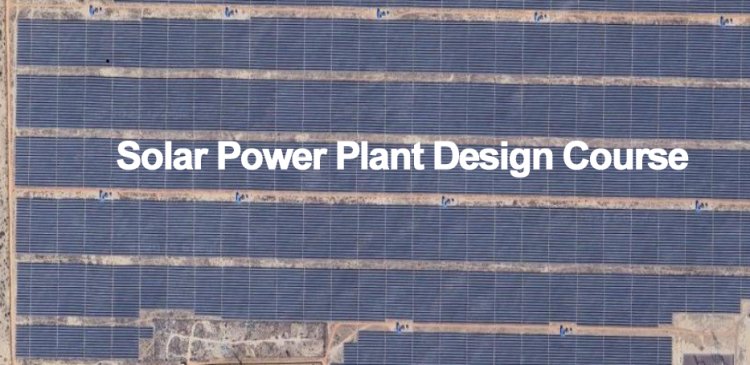Solar Power Plant Design Course
Solar Power Plant Design Course teaches you how to design, engineer, and install solar photovoltaic (PV) systems, covering topics like module selection, system sizing, and electrical design. You'll learn about both on-grid and off-grid systems, including the use of design software.
The market for solar, EV, and battery technology courses presents a significant opportunity due to the rapid growth of the renewable energy and electric vehicle sectors. The solar energy market is experiencing substantial growth, with government policies and initiatives promoting the adoption of renewable energy sources. The battery storage market is also expanding rapidly, fueled by the increasing adoption of renewable energy sources and the need for energy storage solutions.
Course offered by "Institute of Solar Technology" & "Academy of EV Technology"
Course offered by "Institute of Solar Technology" & "Academy of EV Technology"
This Solar Power Plant Design Course provides a vast opportunities in getting wider knowledge in the areas of concept development, site identification, feasibility study, detailed system design, engineering, construction & commercial operation, operational performance monitoring of solar Utility Scale power projects, financial aspects of the solar power plant like DPR,DSCR,ROI,CUF estimation and CAPEX ,OPEX modelling.
A Solar PV Designer's job is mainly to design and develop site plans for solar panel installation. The Design Engineer takes the initial system concept ideas and translates them into fully detailed construction ready designs. Subsequently, the different parameters obtained are compared with parameters obtained in literature and with the parameters obtained by means of specialized PV software. The course aims to equip you with the skills to create detailed project reports and understand the technical and financial aspects of solar power plants.
-
Certification Programs:This is a certificate course, demonstrating your expertise in solar power plant design. This Certificate courses focus on specific areas, like ground-mounted solar projects, rooftop solar installations, or off-grid systems.
Key Skills for Solar Power Plant Design:
-
Understanding Solar Technologies:Familiarity with different types of solar panels (monocrystalline, polycrystalline, thin-film), inverters (string, micro), and other components. This includes understanding the basics of solar radiation, photovoltaic (PV) cells, and the process of converting sunlight into electricity.
-
Electrical Engineering:This involves understanding electrical principles, wiring, cable sizing, and grounding of PV systems.
-
Balance of System (BOS) Components:Courses cover the selection and design of other essential components like combiner boxes, circuit breakers, and protective devices.
-
Component Selection:Choosing the right solar modules, inverters, charge controllers, batteries, and other equipment.
-
Electrical Design:Sizing cables, designing grounding systems, and creating single-line diagrams.
-
Site Selection and Layout:Learn how to choose the best location for a solar project and design an efficient layout.
-
Shading Analysis:Evaluating the potential for shading from trees, buildings, and other obstructions to ensure solar panels receive optimal sunlight.
-
Solar Panel Sizing and Placement:Determining the optimal number and placement of solar panels on the roof to maximize energy production while considering factors like shading, roof orientation, and available space.
-
System Design:Understand how to size and design PV systems, including string and array design. Designing the electrical layout, including connecting modules, inverters, and transformers, to ensure efficient power conversion and grid integration.
-
Inverter Selection and Sizing:Choosing appropriate inverters that match the energy output of the solar panels and the building's electrical needs.
-
Grid Integration:Ensuring the rooftop solar system seamlessly integrates with the local electricity grid for consistent energy delivery.
-
Hybrid Systems:Hybrid systems combine elements of both grid-connected and standalone systems, allowing for both grid connection and energy storage.
-
System Optimization:This includes optimizing system performance by considering factors like tilt angle, orientation, and shading.
-
System Protection:Understanding and implementing safety measures, including lightning protection and grounding. Understanding and adhering to relevant safety standards and regulations for rooftop solar installations.
-
Performance Analysis:Calculating energy yield, performance ratios, and other key metrics to ensure the solar power plant operates efficiently.
-
Project Management:Managing the design, installation, and commissioning of the rooftop solar power plant, including coordinating with other professionals and adhering to safety regulations. Learn how to plan, implement, and manage solar projects, including project reports and budgets.
-
Financial and Economic Considerations:Courses may also cover aspects like life cycle costing, project financing, and financial modeling.
-
Cost Estimation:Learning how to estimate the cost of a solar power plant and calculate payback periods.
-
Economic Analysis:PVsyst can be used for economic analysis, including cost estimation and return on investment calculations.
-
Regulations and Standards:Understand relevant electrical codes and regulations for solar installations.
-
Case studies:Analyzing real-world examples of residential and commercial rooftop solar installations.
-
Troubleshooting and Maintenance:Identifying and resolving issues, as well as performing routine maintenance on solar PV systems.
Benefits of Taking a Solar Project Design Course:
- Career Advancement: Gaining expertise in solar design can open up job opportunities in the solar industry.
- Increased Knowledge: Learn about the latest technologies and best practices in solar design.
- Problem-Solving Skills: Develop the ability to design and implement solar projects effectively.
- Industry Networking: Institute provide opportunities to connect with other professionals in the solar field.
Who Should Take a Solar Project Design Course?
- Engineers and Architects: Individuals with a background in electrical or mechanical engineering or architecture can enhance their skills with a solar design course.
- Anyone interested in the solar industry: Whether you're a beginner or have some experience, a solar design course can provide valuable knowledge and skills.
Training Options:
-
Online Courses:Online Live class courses covering the all aspects of lithium-ion battery manufacturing and assembly.
-
Offline Courses:Offline hands-on training after Online classes with lab facilities and practical experience in assembling battery packs.
Introduce with Trainer:
-
Government of India Awarded Trainer: Profile PageMr Sanjib Roy, an expert in the field and a skilled facilitator, driving the success of their students / startups / entrepreneurs, one of the leading corporate trainers in India, facilitating a wide range of corporate training programs.
He is certified trainer of Solar Panel Installation Technician from NISE, Electronics Sector Skill Council of India (ESSI) on 27th Nov 2015. He teach and mentor of more than 10 thousand startup and engineers PAN India and abroad.

 Mentorship:He is providing guidance and support to students for their success career as startup or engineer.
Mentorship:He is providing guidance and support to students for their success career as startup or engineer.















 Arattai - Chat
Arattai - Chat